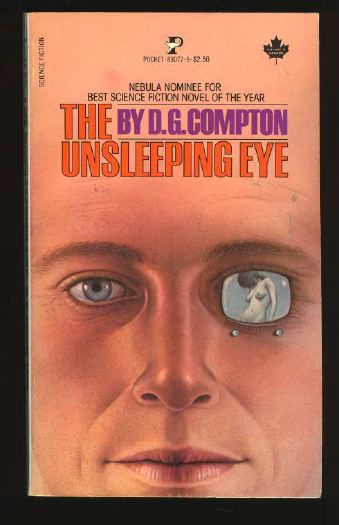Book Review: The Unsleeping Eye by D.G. Compton (also published as “The Continuous Katherine Mortenhoe” and “Death Watch”)
It is the near future year of 2006, and things have changed in Britain. Marriages are now licensed for five years, after which either party can refuse to renew. Most fatal diseases have been eradicated, which means that it’s rare for anyone to die except by misadventure or old age. So it’s a shock to Katherine Mortenhoe, a fortyish romance editor, when she is told that she has five weeks to live. According to her doctor, her headaches and other symptoms have been diagnosed as an untreatable and invariably lethal neurological disorder that is literally burning out her brain.

Naturally, this brings her to the attention of NTV executive Vincent, who wants to film her last days for his highly rated documentary television series. Katherine is disgusted at the idea of being a public spectacle, even for the lordly sum he’s offering as compensation. She uses some of the money to disappear from the big city in disguise, helped by Roddy, a kindly fellow she met in the homeless shelter. What she doesn’t know, but the reader does, is that Roddy works for NTV. He’s an experienced reporter who’s undergone an experimental surgery that turned his eyes into cameras; what he sees is broadcast back to the studio for editing into a coherent program.
As a reporter, Roddy wants to get at the truth of his subject, “the continuous Katherine Mortenhoe.” But as Roddy continues his deception, he may find unpleasant facts about his own soul.
This 1974 science fiction novel reflects many of the concerns of 1970s Britain: student radicals, protestors, police corruption and hippies (here reimagined as “fringies.”) But it also touches on more prescient issues. There’s the manipulation of “reality TV”; by the end of the story, Vincent is revealed to be much more of a villain than we might have guessed. Katherine’s job at Computabook (dba Peregrine Publications) is basically working with AI chatbots given parameters to write like slightly different romance authors, then editing the resulting extruded book product info being actually readable.
And then there’s Roddy’s eyes, a hideous violation of privacy. Almost obsolete in the security cam-overloaded Britain of today, but still something you can imagine as a technology media companies would love to adopt. They come with some severe drawbacks. Roddy can’t close his eyes for more than a few moments or remain in complete darkness before suffering hideous pain. He can’t even sleep!
Roddy, by the way, is the narrator of the book. His sections are in first person. Other people’s sections are in third person, even for things Roddy could never have learned.
There are moments of dark comedy in the book, almost missable because of the deadpan way they’re presented.
The story meanders a bit, but does eventually pay off when the crueler twists are revealed.
Content note: Several deaths. Body functions are discussed with some frankness and crude language. A character is mentioned as having undergone a court-mandated abortion. There’s a drug-fueled party that has bad things happen, but not quite the ones you might expect.
There are certainly some interesting ideas in this book, though I found it a slog in places. It was turned into a movie titled “Death Watch” starring Harvey Keitel, and several editions of the book use that title. Recommended to fans of science fiction that is relatively grounded.

